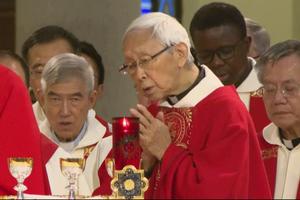Cardinal Zen May Be in Court in Hong Kong Next Week
Cardinal Joseph Zen Ze-kiun is scheduled to appear in court May 24, according to a report by a British daily.

Cardinal Joseph Zen Ze-kiun is scheduled to appear in court May 24, according to a report by the British daily The Guardian.
“A source close to him said the cardinal was set to appear in court on 24 May, adding it was possible that he would be further detained, should charges be laid,” Sum Lok-kei wrote in a May 16 article in The Guardian.
Cardinal Zen was arrested May 11 under China’s national security law with at least four others for his role as a trustee of the 612 Humanitarian Relief Fund, which helped pro-democracy protesters in the special administrative region of Hong Kong to pay their legal fees.
He was released on bail later that day.
Cardinal Zen, who was bishop of Hong Kong from 2002 to 2009, has long advocated for underground Catholics in mainland China.
Bishop David Malloy of Rockford, Illinois, chair of the U.S. bishops’ international justice and peace committee, said May 12 that the cardinal’s arrest “indicates the downward trend in respect for fundamental freedoms and human rights in Hong Kong.”
The president of the Federation of Asian Bishops’ conferences, Cardinal Charles Maung Bo of Yangon, expressed May 14 “profound concern about the situation for human rights and threats to religious freedom in Hong Kong” in light of Cardinal Zen’s arrest.
While Hong Kong, a British colony until 1997, “used to be one of Asia’s freest and most open cities,” it is now “transformed into a police state,” Cardinal Bo said, noting that freedoms of expression, press and assembly “have all been dismantled.” He added there are signs that religious freedom “is threatened” and that religious leaders are self-censoring.
“To see a government in China break its promises made in an international treaty, the Sino-British Joint Declaration, so repeatedly and blatantly is appalling.”
Regarding the supposed crimes of Cardinal Zen, the Burmese cardinal said: “In any system where the rule of law exists, providing assistance to people facing prosecution meet their legal fees is a proper and accepted right. How can it be a crime to help accused persons have legal defense and representation?”
Nancy Pelosi, the speaker of the U.S. House of Representatives, wrote May 13 that since the 1989 Tiananmen Square protests and massacre, “the Chinese Communist Party’s appalling human-rights record and repression of political freedoms have only worsened.”
In an opinion piece at The Washington Post, the California Democrat called Cardinal Zen “a critical voice of conscience: an embodiment of moral fortitude, who has been a constant presence as Hong Kong has led a decades-long pursuit of the freedoms promised with the handover from British rule.”
She also noted China’s failure to uphold the terms of Hong Kong’s handover: “Nearly 25 years later, China’s pledges have been utterly abandoned. Any pretense that Hong Kong’s rights would be respected has been shattered by violence and intimidation.”
Vatican Secretary of State Cardinal Pietro Parolin, told journalists May 12 his “most concrete hope is that initiatives like this cannot complicate the already complex and not simple path of dialogue between the Holy See and the Church in China.”
- Keywords:
- cardinal joseph zen
- human rights
- religious freedom














